I finally watched it, and it’s TERRIFYING.
A group of people were trapped inside a convenient store when the tornado — the deadliest single tornado in the US since 1947 and the ninth-deadliest tornado of all time — ripped through Joplin, Missouri. The video is horrifying.
It sounds like something out of a disaster movie.
Unimaginable:
Commenter jinxtgr got me thinking (his comments are after the jump): whether or not you believe that the recent floods, hurricanes, and tornados are the result of natural or human-caused climate change, it seems fairly obvious that the weather as of late has been bizarre, to put it mildly; so the question becomes what now?
The below explanation about the patterns of weather I find fascinating and compelling. As I understand it, his argument boils down to this: Weather is a chaotic system, but falls into predictable chaotic patterns. There are no weather flukes or outliers, only weather indicators. Climate change simply shifts the weather patterns (like an Overton Window, if you will), creating storms more destructive than we’ve ever seen because it pushes the outer limits of how destructive a storm can be to Really Fucking Destructive.
This doesn’t mean that every storm is going to be as destructive as the one in Joplin. It means that Mother Nature is telling us “This is how bananas I can get. Just you wait and see.” In any event, the weather tomorrow is supposed to be terrible throughout the Midwest, so there’s that.
I don’t know what to take away from all of this. After the tsunami hit in Japan, I stayed awake all night, reading about the Ring of Fire, waiting for an earthquake to hit, and wishing I had some earthquake insurance. I spent the following days watching every Discovery Channel program I could find on tsunamis.
Needless to say, I don’t know anything about this stuff, but I find it fascinating:
It’s very, very simple. There doesn’t even have to BE a model, much less anything predictive- in fact it’s the opposite of predictive.
Weather is a chaotic system. Climate is a gauge of the energy in that system. Climate can be tracked in a broad, general sense. Weather cannot- it is chaotic, meaning it follows the mathematical rules of chaos as first discovered by Lorenz with (surprise!) a toy weather modeling equation.
Chaos works like this: if you have very little energy, things are stable. As the energy in the system increases, the range of possible states expands. At some points, the system can fall into predictable chaotic patterns: in weather, this would be knowing the general force of storms and cyclones, having a basic idea of how big these things are.
As the energy increases, the range of possible states continues to expand, and what you used to know about ‘how big tornadoes are’ stops being useful.
I’ll repeat that: as the energy increases (as the climate imperceptibly creeps upward in temperature), you stop being able to predict how big things like storms and cyclones will be.
If the CLIMATE stopped heating, and cooled off, the WEATHER would return to the tornado sizes people are used to.
It’s not going to do that.
As the CLIMATE continues to heat, by seemingly meaningless numbers (what’s a degree or two? right?), the WEATHER can and will start throwing up outlier events, storms and tornadoes that are unprecedented in size and destructiveness.
What we don’t know (?) is whether this is also causing the earthquakes- seems likely enough but I don’t know the laws under which tectonic plates move, they might not really be fluid enough to have chaotic behavior.
Weather does.
Climate sets the base energy level for weather.
Climate change directly causes the increase in potential destructive force of weather, because weather is a chaotic system.
It has NOTHING TO DO WITH STUDY OR THEORY! It is a mathematical formula like 2+2=4! There is nothing even slightly ambiguous about any of this!Right now I would say, as a longterm plan get the hell out of any place, anywhere in the world, that is ‘tornado alley’ or ‘hurricane central’ or any of that. Seriously.
Because this is just a little teaser of what we will end up facing in just ten years and it’s too late to change that even if everyone suddenly woke the FUCK up.
Please, work to communicate these very basic and obvious points, because it can get worse or it can get ridiculously worse- and we as a species are stupid but we don’t really deserve what chaos can throw at us. The planet will be fine- it’s a big rock. Life on it? That’s the 100-year, 1000-year question.
For anyone who can’t read long posts, here’s your take-away:
Next year’s tornado will be worse.
Bet your life on it. It’s not up for debate. If this one was bad, next year’s will be worse. The year after- worse still.Within fifty years, we will lose an entire state to this. Either tornado alley or hurricane central. Get out.
[Emphasis his.]The reason for terrible tornado seasons in the past is that weather was already chaotic.
Climate change means that it’s still chaotic but the possible maximum destruction goes up and up and up.
It’s not the fact of ‘fluke bad weather’ that’s an issue: that was already inherent in the system. What we are changing, and changing rapidly, is the scope of what that can mean.
Think of it like this: any given weather event could be considered as a marker for future events within one order of magnitude. So you get a tornado- might get another one a tenth the size, might get one ten times the size, don’t expect a thousand times the size.
Get one ten times the size, now expect a possible maximum of ten times the size of that, because you’ve established what’s within the range of possibility. Get one twice as bad, suddenly you’re considering possible storms 200 times as bad as what you once thought normal.
In a situation of climate change never assume a record weather event is something that will hit and go away forever, because it’s just demonstrated the range of the pattern of behavior. Not the maximum limit- it just demonstrated the range weather goes across now. You can safely expect that any given weather event is part of a chaotic pattern and that pattern just showed you weather could go there, anytime.
Because outlier weather can’t happen. It’s always part of the chaotic system, always showing the possible range of behavior.If that seems like it’s worse than it used to be… o_O then what the hell have I been saying? That’s the whole point of climate change.
Scary stuff.
[images via CBS/AP]
[cross-posted and such]
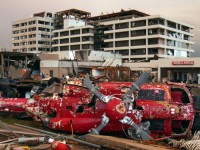
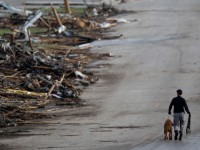
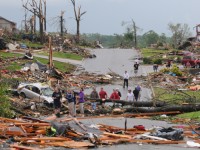
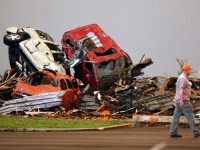
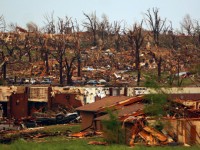
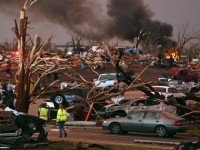
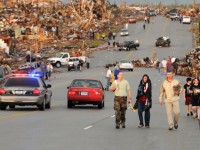
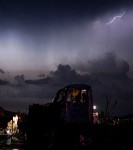
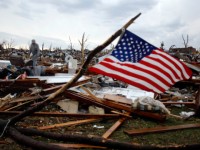
AxelFoley
Damn…
Donna
Tremendous explanation!
SiubhanDuinne
Brilliant, albeit terrifying, explanation. Thanks for the post.
Baron Jrod of Keeblershire
Unfortunately, getting out of the midwest really isn’t an option. That’s where our food is grown.
Besides, where is there in the US that’s not prone to hurricanes and tornadoes? There’s the northeast (vulnerable to horrific winter storms), the west coast (vulnerable to horrific earthquakes) and the southwest (a goddam desert).
There’s nowhere to run, except maybe on the Rockies.
Xenos
This is what I love about blogs – people looking for and finding experts to explain what the hell is going on, rather than some media executive deciding what people should know.
Fucen Pneumatic Fuck Wrench Tarmal
@Baron Jrod of Keeblershire:
in western pa, we get the occasional flood, and the every/other 8 years republican governor plague. all in all, it ain’t too bad.
Odie Hugh Manatee
What a nightmare. This is what heat (energy) does and it doesn’t take much of it to make a huge change. The scaling of it is something that is beyond the comprehension of most people. They hear a degree here and there and think ‘that’s no big deal!’ when in reality it is a big deal because of the scale.
The idiots and ignorant think local and forget that the whole world is involved in the making of weather. Kind of like a surfer who doesn’t understand that the huge wave they want to ride can easily kill them because they can’t comprehend that they are basically wrestling with a flexible brick wall.
At a large enough scale, the brick wall wins. When the meteorologists talk about hurricanes over the ocean, they explain that the warmer the water, the more energy the hurricane has. Convection baby, it’s more than a word.
PreservedKillick
Not sure how workable a plan this actually is, but as a general guideline, hard to argue against.
One thing about all this arctic ice melt, is that it is possible that it will shut down the gulf stream. This has happened in the past, it can happen again.
Now all the heat that the gulf stream is channeling out of the Caribbean is trapped down there. The obvious first order effect is that it is about to get dramatically cooler all along the atlantic seaboard of the US and in northern europe. That’s small stuff; what’s really scary is that all that heat needs to go somewhere, and that somewhere is probably into hurricanes. Look what happened when Katrina moved across a stretch of warm sea; imagine that becoming the norm.
And yeah, I just don’t think we have “horrific winter storms” in the northeast. Yeah, they are a pain in the ass, but “horrific” just isn’t the operant term. Annoying is closer to the mark.
We are much more at risk of having summer go away.
debbie
Speaking from the Midwest, I can testify that the lightning is nastier than it used to be. It’s all cracks and crashes now. It’s much more threatening.
Baron Jrod of Keeblershire
@PreservedKillick: I was being kinda flip in my earlier comment, but it is true that everywhere in the country is at serious risk from climate change in one way or another. There’s no moving away from a disruption in agricultural production, for instance.
Let’s not forget the possibility of the sea levels rising either. If that happens, all the coasts are a loss. I figure it would happen slowly enough that most people could evacuate, but then we’re dealing with the problem of 100 million or more refugees. Throw in a famine breaking out and the fact that the country is awash in guns, and We The People will finish the job that mother nature started.
Not that I’m advising anyone to stay in a tornado alley, but climate change will catch up to all of us, everywhere, eventually.
Phoenician in a time of Romans
Look what happened when Katrina moved across a stretch of warm sea; imagine that becoming the norm.
It’s more than just that warm sea getting warmer – that warm sea gets larger too.
i recommend John Barnes’s “Mother of Storms” for apocalyptic weather porn.
stuckinred
Ev’rything’s agin’ me and it’s got me down
If I jumped in the river I would prob’ly drown
No matter how I struggle and strive
I’ll never get out of this world alive.
bob h
One way to think about it is that warming has caused the moisture content of the atmosphere to increase, and water vapor is fuel for storms. It is a little like putting more dead timber in the forests for forest fires.
Tom Betz
Just found this graph of 2011 tornadoes vs the average 2005-2010:
http://www.spc.noaa.gov/wcm/ptorngraph-big.png
Holy shit.
More like it at http://www.spc.noaa.gov/wcm/
Neil
@Baron Jrod of Keeblershire:
Snow, as a general rule, doesn’t kill you (save for the shoveling out).
Up here in the NE we’re having a period of heavy precipitation. Not just snow, but rain as well. Lake Champlain up in NY and VT exceeded its historical high mark by a few feet.
Lets all move to Canada. The politics there seem relatively saner, the warming climate probably means they’ll have the new mid west when ours turns into a desert.
PurpleGirl
@PreservedKillick: I forget what the term is, involving air mass movements for the Arctic area, but they have already been changing because of the ice melting in the Arctic and off Greenland. I saw a reference to it the other day but I can’t remember where (i.e., which blog or news site).
The Gulf Stream has been changing and sending warmer water eastwards through the Atlantic toward Europe. It splits into two streams and one goes toward the Canary Island — the breeding grounds of hurricanes.
ETA: IOW, the extreme becomes more extreme.
Nick L
It seems that right now we’re also on the shit end of an El Nino cycle, which isn’t necessarily due to climate change.
But climatologists seem awfully concerned that global warming is making El Nino worse. From Wiki:
Yeesh. Anyway, it’s interesting that we’re climatologically fucked alongside our economic fuckedness – Bill McKibben sez that the droughts in Oklahoma, Texas, etc., are the worst since the Dust Bowl (albeit minus the dust, which was due to haphazard deforestation). I guess Obama really is this generation’s FDR.
Baron Jrod of Keeblershire
@Neil: Winter weather is deadlier than you think.
According to these stats, on average cold kills 18 people a year and winter weather kills 44 people a year. Together, this in on par with annual tornado deaths. However, these stats don’t include people who died in car wrecks as a result of slick roads, so the snow may very well kill a lot more people than any other type of storm.
I don’t have time to hunt down any of those stats right now, but hopefully someone else can figure it out. The point is, don’t underestimate the winter. She’s deadlier than she looks.
Alex S.
This explanation almost sounds as if you could actually calculate the potential damage with a statistical model. In a way, climate change increases the variance of the variable ‘weather’. Or to be more precise, with the rise of energy within the global weather system, not only the expected value but the variance as well shifts towards a level of more intensity… if that makes sense…
On the other hand, I sometimes have to wonder how much of the destructive side-effects of weather is not because of climate change but because of the rising human population, especially when it comes to death tolls. The midwest used to be relatively empty until a few decades ago. Cynically speaking, it is almost impossible for a tornado not to hit any human settlements nowadays.
And, of course, earthquakes are still an entirely different matter since they are not man-made (yet). But the side-effects, like the destruction of a nuclear plant, are directly related to the expansion of humanity.
Deathstar
Idiotic comments are understandable but repeating them on the front page as if they are representative of an “expert” analysis will make this blog a laughingstock.
We have stupid:
“whether this is also causing the earthquakes- seems likely enough”
… piled on top of really stupid:
“Climate sets the base energy level for weather.”
And ABL finds it “fascinating.” At least she has the sense to admit her ignorance.
(Not for nothing but the “science” of the comment seems to be something cribbed from Jeff Goldblum in Jurassic Park. Are you sure you weren’t Sokal-ed?)
jinxtigr
In fairness, people could also do things like build underground, as if they were colonizing hostile planets. Any bunker that could take a bomb would definitely handle a tornado. It is possible to make habitable shelter on Mars or in space- we’re just not used to doing it here.
The bit with expecting stuff within one order of magnitude is just a thought experiment to try and get across the way chaos scales: I’m sure if there’s an actual figure it’s not exactly one order of magnitude, but it’s that basic type of calculation.
James Gleick’s book “Chaos” is a very good overview of how this stuff works- http://www.amazon.com/s/ref=nb_sb_noss?url=search-alias%3Dstripbooks&field-keywords=gleick+chaos&x=0&y=0
abo gato
OT, but @stuckinred, I just finished reading Steve Earle’s new novel, “I’ll Never Get Out of This World Alive” novel and recommend it to all of you. Wow, not only can he play the hell out of his guitar and write some fucking great songs, he can write a novel that is one of the best books I’ve read this year.
It may have more meaning to me as I am in San Antonio and am a native, but the book is set in 1963 SA and it has Hank Williams, the Kennedys, prostitutes, miracles, drug addiction and it is a freaking brilliant read. I understand the peculiar nature of my city and so does Steve Earle.
Bobby Thomson
@Tom Betz: Thank you for introducing these data to this conversation, which was getting to be way too much discussion about the good old days when tornadoes didn’t exist.
PurpleGirl
@Alex S.:
There is climate change and weather weirdness but your point about increasing human populations is a complicating factor. Where do we move people if instabilities are developing in all areas and resources will be harder to find and use? Maybe one answer is to control population growth — which ideally should have been done decades ago.
Snarki, child of Loki
@Alex S.:
Do you get out to the rural midwest much? From direct experience (and census figures, IIRC), the rural midwest is DEpopulating. Small towns are withering away, as the young folks move to larger towns or the cities.
Yes, the total population is going up. But less dispersed.
So, from a tornado’s point of view, there are fewer targets but they are larger.
Ghanima Atreides
@jinxtigr: very nice explanation. the one i remember from systems modelling is trying to model a running brook flowing over a rocky bed. there is no way to do it, because the wavelets, dips, spray, flow etc make up a chaotic system. the addition of more water adds more energy. the events in the streambed can then reach new upper and lower bounds, and unless the additional water/energy is removed, the new bounds will be continuously accessible.
@ Alex
In the West increasingly chaotic rainfall and increasing incidence of lightening storms combines with settlement of drought vulnerable regions in the same fashion. Wildfires used to burn naturally and relatively harmlessly in places where there are now human settlements to catch fire.
@Purplegirl
The American model is to actually encourage population growth. For example, as the result of a half century of feelgood infant mortality reduction programs and american missionariism without concurrent birthcontrol education (see George Bush, Peace Corps, Christian and Mormon mission groups, etc.) the population growth in parts of Africa is triple digit.
bkny
it’s not just a matter of relocating to avoid the weather — keep in mind the invasive species (plants and bugs) that are now beginning to wreak havoc. or just the results of the flooding that has damaged already planted crops.
i am so glad i don’t have kids; i truly believe there are some very nasty years ahead.
Brian S
@jinxtigr: Out of curiosity, how able are we to put the equivalent of skyscrapers underground? Single family homes I can imagine, but I have a little trouble wrapping my head around dense populations underground, especially once you factor in things like keeping the air clean.
jinxtigr
@Brian S: It’s not so much about how we do these things- we went to the moon, that’s harder than surviving a tornado.
It’s about getting down to work on the fact of dealing with these things, in a world where a substantial population considers climate change a political football, and will expend their effort on denying it and resisting any planning done in the context of it.
Gotta admit I got really angry in the source thread, all getting treated like I was some subsidiary of Acorn XD ‘keep politics out of our disasters AND gummint out of my Medicare!’ The politics is that we’re doing a huge proportion of the climate change relative to our population. However, China’s trajectory for greenhouse gases is even more alarming.
In a lot of ways, we’re absolutely compelled to start dealing with these escalations of weather, and figuring out what to expect, because we are not going to deal with the climate change. The window’s missed. On a greenhouse gases chart, ‘the rest of the world’ is bigger than either USA or China…
It may seem crazy, but be ready to imagine putting skyscrapers underground on Mars- because one day, generations from now, our planet may be more like that than you’d think, and I bet you humans will still be hanging on finding not just shelter, but making whole worlds for themselves.
If we won’t go to the treacherous adventure of off-world colonizing, the treacherous adventure of off-world colonizing will eventually come to us. In 1000 years this planet will be unrecognizable to the people of today.
tom p
IT”S THE END OF THE WORLD!!! WE’RE ALL GONNA DIE!!! DIE DIE DIE!!!
Ok, couldn’t resist… anyway, thanx ABL for the best, simplest explanation I ever read of climate change and why it is a problem.
Alex S.
@Snarki, child of Loki:
I had to check Wikipedia. But it turns out that Joplin grew by 20% in the past 20 years. You are probably right about the very small places with population numbers in the triple or quadruple digits. And if a Tornado hit those, you might not even hear or read about it becuase the casualty number would be so low. But on the other hand, even the mid-sized towns are growing, not to mention the growth of the suburbs that take up a lot of space.
Cermet
@Tom Betz:Great graphs (NOAA does it again.) Looks like – once again! – the last ten years is setting all time records and tornado’s are getting worse. The fact that the data proves that the occurrence of tornado’s is well above average (for worse case mean, no less!) is scary and proves that AGW is biting. So, as CO2 levels climb the old saying goes, “You aren’t seen nothing yet!” is really going to hold in spades.
At least we will only ‘see’ minor effects like these compared to most of the world (read third world) to will be dying in the hundreds of thousands as droughts, floods and monster storms wipe out their crops. Unlike us, we have the wealth to still aid the survivors.
Lee
The cooler in a store is by far the safest place unless the store has a basement.
Not sure why everyone was not already in the cooler before the tornado hit.
That sounded like a really slow moving tornado, which might be the reason it was so deadly.
Ryan S
The death toll is set to rise a lot today, we are being told. I cannot emphasize how much this tornado was a perfect storm. It hit THE most densely populated area outside of Springfield or Kansas City. Dozens of bricks apartment buildings are almost completely gone. Not just wooden houses. A friend of a friend’s husband is still missing. He sought shelter in the Pizza Huts walk-in freezer. His wife didn’t make it inside. However, She survived barely. The walk-in is gone they haven’t found it yet. There were hundreds still missing the last time I was told.
magurakurin
a super tornado is a gnarly thing to be sure and the awesome destructive power of weather is a thing to be respected. I’ve done some mountaineering and I have a deep respect for weather. But that being said. Tornado smaydo. Once you start reading about geology then you really begin to see just how crazy Mother Earth can get if she wants. The Columbia River Basalt flows have always blown my mind as one small example
http://vulcan.wr.usgs.gov/Volcanoes/ColumbiaPlateau/description_columbia_plateau.html
You can see the layers of all this successive flows if you drive through the Columbia Gorge. But when you stop to think that in between each layer there were long periods of 10’s of thousands of years, then it becomes truly mind blowing. That means after these fast moving flows wiped out everything in there path, everything basically grew back. Only to be zapped out by God shaking the Etcho-Sketch all over again. So in about a week, everything from the great fissures in Eastern Washington/Oregon onward to the sea was covered in molten lava. Fuckin’ totally gnarly. You would need a bizzillion kajillion tornadoes to do the same.
Ryan S
I would also like to say that the tornado hit what is called restaurant row which is where everyone goes on weekend evenings to dine out. So theres always literally thousands of people at the time the storm hit. And as someone whos GP doc practices in the buildings around St John’s the area around the hospital was not wide open like it is now after the storm there where buildings piled on top of one another because that hospital was the largest in the area and a center of the medical establishment. I lived 50 miles away from it and thats where I went because of the doctors there.
Tom Betz
@Bobby Thomson: What strikes me most about what I see there is that we seem to be on track to have just a bit more killer tornado action than we did in 2005… which leads me to wonder: how does this year compare to 2005 WRT hurricanes?
John Emerson
One area where the climate change isn’t anecdotal is North Dakota. They called the 1997 flood that took out Grand Forks a “50 year flood”, the kind of thing that happens twice a century. I can’t find exact numbers but in the 15 years since then they must have had at least 5 more “50 year floods”.
The water all ends up near Winnipeg, but the Canadians, being Communists, figured out what to do 50 years ago when they had a big flood there.
CaptainFwiffo
For informed discussion of both current weather events and climate, I recommend Dr. Jeff Masters’s blog at the Weather Underground. He does a good job of providing historical context, comparing recent tornado and hurricane events to those in the past, etc.
Ghanima Atreides
@jinxtigr: there is always the Lifeboat.
I’ll save you a seat, fellow aspie.
BR
@Deathstar:
Climate change does increase earthquakes. No, it probably didn’t cause the one in Japan, but overall, it does.
http://climateprogress.org/2010/12/21/was-the-2010-haiti-earthquake-triggered-by-deforestation-and-the-2008-hurricanes/
http://climateprogress.org/2010/04/19/global-warming-link-volcanoes-earthquakes-landslides-tsunamis-royal-society-scientists/
Jamey: Bike Commuter of the Gods
@Lee: Yeah, because there’s all that glass around to absorb the storm’s energy… /rolls eyes.
Judas Escargot
@Ghanima Atreides:
You certainly can model that running brook over a rocky bed. You just won’t be able to make any deterministic predictions regarding its behavior, only stochastic ones.
If I throw a ball in a certain direction, that’s a simple system to model, and I can predict where that ball will land pretty well: “The ball will land at location (x,y)”. That’s a deterministic prediction.
Once a model gets too complex/non-linear, though, it gets chaotic. So the best you can do is predict stuff along the lines of “The probability of X happening when Y is true is Z%”. That’s stochastic. But it’s still a valid prediction.
My point: The common notion that “you can’t model a chaotic system” is false. You can model chaotic systems, and the predictions you can make from a good chaotic model can be pretty useful. It’s just that those predictions have to be of a different “flavor”.
Ghanima Atreides
@Judas Escargot: /yawn
i was taught that chaotic systems are overparametertized.
Judas Escargot
@Ghanima Atreides:
I’m not here to entertain you: So if you’re bored, feel free to STFU. Or, even better, stop spreading Deepak Chopra-style Pop Science Poseur-Memes that have nothing to do with real work. Then other people wouldn’t have to waste their precious time correcting you.
And, indeed, they are (such a good little parrot, A- for the term). But this just means that you can’t estimate all initial conditions from the available data without some error. Error that gets “amplified” by the model as it runs over time.
But if you know (or can reasonably guess) the statistics of that error –which is often possible– you can still derive a model of a “chaotic” system, capable of stochastic prediction, that will be useful in the real world.
celticdragonchick
@magurakurin:
It’s even more impressive to consider that the Columbia River flood basalts were actually on the small side for those kinds of events. Check out just how much basalt was extruded in the Deccan Traps and the Siberian Traps.
Jay
As a meteorologist, I find that while the argument is clear about the possible connection between climate change and extreme weather, I would disagree that the connection is as “simple” as it appears to be. There are a few break points I see sprinkled throughout the otherwise insightful (if somewhat too direct, from a meteorological standpoint…firm cause-and-effect statements in atmospheric science are difficult to rigorously defend) statements. One obvious one is that more energy does not necessarily mean more destruction. A garden variety winter storm or even a broad area of light precipitation dissipates/redistributes a lot more energy than a thunderstorm with a destructive tornado. But the tornado is a lot more dangerous to life and property.
I agree that climate change is indicative of the potential for more outliers (or redefining what is meant by an outlier) in the weather. But making a one-to-one correspondence between energy and violence/destruction is not valid. And stating that “next year’s tornado will be worse” is also rather misleading (or brave, I guess, depending on your viewpoint), as neither climate change nor weather always changes in one direction. They fluctuate around the mean. It could be worse, it could not. Saying that it is likely that the tornado seasons will get worse over the next decade is, I feel, a more reasonable statement.
Anoniminous
Climate isn’t a Chaotic System, per se, and thankfully so. Otherwise we’d be looking for storms packing 450 mph winds (eek!) with meters per hour (eek!^2) precipitation.
Climate is a Complex System containing Class IV (Chaotic) Behavior shifting the Fitness Landscape defined as: the boundary conditions of what can happen and the various instances of what does happen; these are intimately linked due to Feedback Loops, Tipping Points, & all that jazz.
Weather is a Complex System as well but it is much more “Chaotic” since is more affected by and responsive to small changes, e.g., Gulf of Mexico water temperature, iterating to observable “outside the norm” phenomena, e.g., tornadic activity.
Example: the tornadoes in the Southeast were driven (caused) by a 950 millibar (!) low pressure system over the Midwest drawing warmer, moister, air from a 1 degree C above average Gulf water temperature meeting dryer and colder than normal arctic air.
None of this is particularly startling … it was, however, unexpected when basing predictions on previous norms.
The weather we’re going to get over the next decades will be More So. El Nino isn’t going to go away but the affect of an El Nino will be heightened. The Southwest, where I live, isn’t going to turn into a tropical rainforest but it is going to experience increased drought punctuated by periods – such as the 2010/2011 winter – of increased precipitation. If you are in an area that has tornadoes those tornadoes will tend to be stronger inflicting more damage. If you live in an area with winter snow you’ll have “unusually” heavy snowfall such as DC last winter or “unusually” light snowfall such as the Sacramento Mountains of New Mexico. F1 tornadoes will become rarer, F5 tornadoes more common; Cat 1 hurricanes rarer, Cat 5 commoner, and so on.
Lee
@Jamey: Bike Commuter of the Gods:
Have you ever been in a cooler? Some are huge, the front facing part is sometimes only a small part of the entire cooler (delivered beer for 2 years in college).
Take a look at the damage, if there is any part left standing of a store it is going to be the cooler and/or the freezer.
James E. Powell
This means you are qualified to appear as a climate-change expert on FOX and all other right-wing outlets.
polyorchnid octopunch
@Neil: No. Do NOT start spreading that idea around.
Thank you,
A Concerned Canadian
polyorchnid octopunch
@Baron Jrod of Keeblershire: As a person who lives in Canada, you’re kidding, right?
DBrown
@Anoniminous: Ugh! I hate both types of weather (snow and tornados) – damn. But then, at least we will still eat unlike most of the third world over the next ten to twenty years.
Baron Jrod of Keeblershire
@polyorchnid octopunch: Yes, the stats I linked to are a big fucking prank. I’m in cahoots with weather.gov to totally fool people into thinking winter weather kills people.
??
Is it that hard to believe that people freeze to death when it’s freezing? Is it really that hard to believe that traffic fatalities go up when the road becomes a sheet of ice?
Winter lasts four months or more. These people aren’t all dying in one crazy day, you know.
polyorchnid octopunch
@Baron Jrod of Keeblershire: Yeah, but more dangerous? More people died in Katrina than in years of winter weather in Ontario.
polyorchnid octopunch
@Baron Jrod of Keeblershire: While I’m at it… that’s mostly because a lot of folks on the US east coast don’t know how to do winter driving… not to mention not having the gear to take care of it properly. The likelihood of finding roads that are “sheets of ice” very often in Ontario and Quebec is very very low indeed, because we have the knowledge and equipment to keep them from becoming so.
We also have a comprehensive welfare system and laws against turning utilities off in the wintertime, so the likelihood of having people freezing to death (or dying of heat stroke in the summer, for that matter) is much lower here.
The stuff that phreaks you people out and causes massive coverage is just routine to us.
Baron Jrod of Keeblershire
@polyorchnid octopunch: Well bully for you, I guess.
According to this, in the US we had 108k excess winter deaths in 2006, and in Canada that number was 5600 in 2008. But, these are not per capita numbers. Since Canada has about 1/10th of the US’s population, that means that per capita winter deaths in Canada are about half that suffered by the US. That’s not nothing.
BTW, we have fucking snowplows and road ice here in the states too. We’re not complete gibbering savages down here, jackass.
Winter kills people. I’m utterly shocked that this is a controversial contention.
polyorchnid octopunch
@Baron Jrod of Keeblershire: Touchy touchy. You were implying that it kills people more than other types of weather do.
I’d suggest that the presence of snowplows and road ice aren’t what delineate people as savage or not. Throwing some pissant little third world country up against the wall every decade or so to prove that you mean business would seem to have more bearing on whether a people can be considered gibbering savages.
You really need to work on your attitude when people call your claims into question. What… don’t like having your innate US exceptionalism called into question or something? Sheesh.
Go ahead and have the last word.
ABL
@Deathstar: i’m fairly certain it’s jerks like you that make this blog a laughingstock.
ETA: look up the word “fascinating.” you might find it… fascinating.
Jrod
Fuck you, troll. There’s your last word.
Anoniminous
@DBrown:
Africa, much of Latin America, and SE Asia is going to be Ground Zero for GW induced depopulation. I used to follow food production and so on in those areas …. before it got too depressing.
A bright spot is food production in Africa just south of the Sahara is actually rising. Some guy, whose name I can’t remember, came-up with a way to use trees to shade his growing spaces. The amount of water the tree uses is minimal compared to sun caused evaporation.
asiangrrlMN
I freaked myself out listening to this in the wee hours of the morning.
@polyorchnid octopunch: I’m with you in the substance of your remarks. Winter is brutal in places (like MN, which is one thing I love about my home state), but it’s par the course in terms of natural phenomena. Will people die from the effects of winter? Yes. That’s just a part of living in a state with really hard winters.
uptown
Crappy construction has a lot to do with the severe damage to buildings. Lack of safe rooms or storm shelters/basements made it harder to survive in many of the buildings.
I grew up in the Midwest, we had a basement and used it many times to wait out a storm.
wobbly
Yeah, whatever happened to STORM CELLARS? Back in the day Auntie Em and Uncle Henry didn’t have a whole lot of money, but, living in tornado country, were not short on common sense. They built themselves a storm cellar in the backyard and were perfectly safe while their feckless niece and house got blown away to Oz and back….
Seriously, I thought people in “tornado prone areas” always put something like this on the property. Kind of like how we, in the northeast snow disaster zone, have storm windows and and ice scrapers at the ready.
tde
I really hope the woman who was saying “jeesus ….. jeesus….. heavenly father … jeesus” got crushed by a slurpee machine